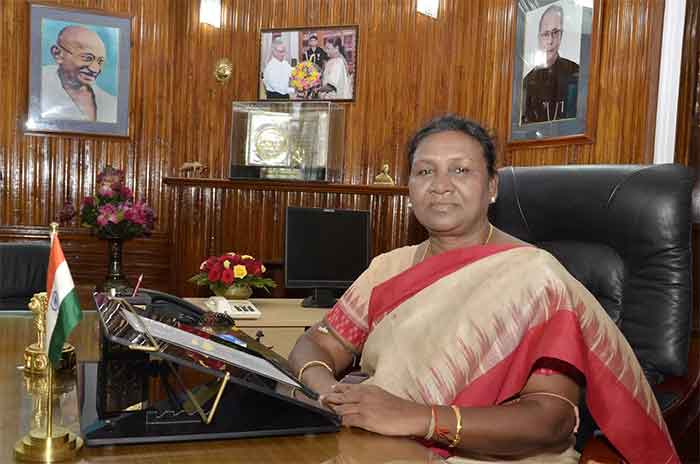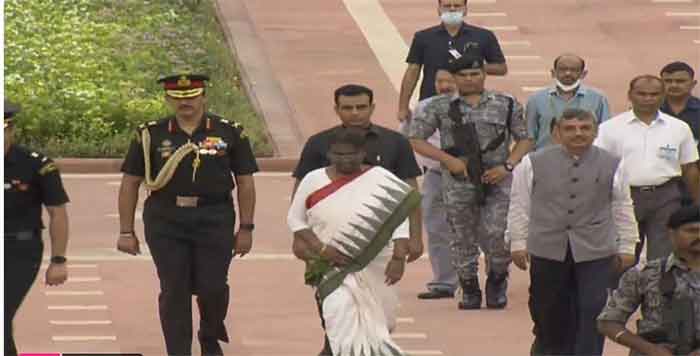To
Smt Droupadi Murmu
President of India
Rashtrapati Bhawan
Respected Rashtrapati Ji,
I wish to congratulate you on being elected as the President of India. As the first representative of the adivasis of the country, I have no doubt that you will take a proactive role in re-orienting the policy of the government for the overall betterment of the adivasis’ lives and their self-confidence.
The Constitution of India has conferred special rights on the adivasis in general and, in particular, on those residing in the areas notified in the Fifth and the Sixth Schedules. There are special laws promulgated under those Schedules that empower the local institutions such as the Gram Sabhas and the village councils to have a say in decision making in matters that concern their lives.
It is unfortunate that the special laws, especially the provisions of the Panchayats (Extension to the Scheduled Areas) Act (PESA) and
the Scheduled Tribes and Other Traditional Forest Dwellers (Recognition of Forest Rights) Act (otherwise referred to as the Forest Rights Act or FRA) are more often violated than complied with. Such violations not only adversely affect the adivasis’ livelihoods but also make a mockery of the concept of self-governance that is consistent with the democratic character of our polity and is central to empowering the adivasis in deciding on the path of development as they perceive it.
Article 244, read with the Fifth and the Sixth Schedules, places a special responsibility on the high offices of the President and the State Governors to ensure that the provisions of the two Schedules and the provisions of the laws made specially for the well-being of the adivasis are enforced strictly. It is in that connection that I wish to make the following submissions for your consideration. In the past, I had made similar representations to your predecessors, copies of which are forwarded here.
- Para 5 of the Fifth Schedule requires the government to review any law that is applicable to the rest of the country and adapt it to suit the adivasis’ interests beforeextending the same to the Fifth Schedule areas. The power conferred under this Para is unique and it has not been invoked as adequately as necessary by most States or the Centre since Independence, either in letter or in spirit.
Had the government exercised its authority under the two Schedules to adapt the laws relating to land, minerals and other natural resources to be consistent with the adivasis’ interests, such a step would have gone a long way towards assuring the adivasis of the government’s commitment to govern the Scheduled Areas in line with the expectations of the makers of the Constitution. It is ironic that the government at the Centre should, instead of amending the laws dealing with minerals, forests and so on in line with what the adivasis want, alter the same to the detriment of the adivasis’ interests. The recent amendments introduced in the case of the rules and the regulations pertaining to forests and minerals are an example of how the present government has ignored the adivasis’ expectations and welfare.
- Major policy changes and decisions on projects and schemes that affect the lives of the adivasis cannot be implemented without prior consultation with the National Commission for Scheduled Tribes (NCST), an institution set up under Article 338A. There have been several instances in which such prior consultation with the NCST had not taken place, while the governments at the Centre and in the States had taken decisions unilaterally.
- In several States in which there are areas notified under the Fifth Schedule, where decisions on policies, projects, schemes etc. that affect he interests of the adivasis are taken, ignoring the local Gram Sabhas in violation of the PESA and the FRA and without prior consultation with the State Tribal Advisory Councils (TACs) constituted under the Fifth Schedule. Some States have either not constituted the TACs or have delayed constituting them. This negates the idea of self-governance, mandated in the Constitution, in respect of the Scheduled Areas, as already pointed out earlier.
- The Governors of the States in which the Scheduled Areas are located are required to submit their Annual Reports on administration in the Scheduled Areas but such reports are rarely submitted on time and, even when they are submitted, they do not fully reflect the shortcomings in governance.
- While all other public authorities are subject to reservations for the SCs/STs/OBCs as mandated in Articles 15 & 16 of the Constitution, the same have not been made applicable to the higher institutions of the judiciary. Reservations provide a sense of empowerment to those disadvantaged sections and also have the effect of providing a perspective of the interpretation of the laws from their point of view. There is no plausible reason as to why the higher echelons of the judiciary should not be subject to reservations, which are an obligation cast on all public authorities by the Constitution. I had earlier appealed to one of your predecessors to persuade those concerned to help enact a law urgently, if necessary, to translate this into a formal arrangement. It is high time that this issue is addressed at the earliest.
I would earnestly appeal to you to address these concerns urgently by initiating the following measures.
- Set up a committee of eminent experts and representatives of the adivasi communities to identify the important laws which are applicable to the Scheduled Areas, review them from the perspective of the adivasis and recommend suitable amendments to adapt them to conform to the adivasis’ interests.
- Advise the Governors of the concerned States to submit annual reports on the administration of the Scheduled Areas, especially making a detailed mention of the status of enforcement of the PESA, the FRA and the other laws specially applicable, whether the TACs have been constituted and whether there have been any instances of ignoring consultation with them, the shortfalls and the efficiency in the expenditure on the adivasi development schemes as required and as provided in the Tribal Sub-Plan allocations, reservations for the STs in the State as per the laws and the regulations applicable, measures taken by the State for safeguarding the culture and the traditions of the adivasis and so on.
I earnestly hope that you will get each one of these suggestions examined carefully so as to further the interests of the adivasis.
Respectfully,
E.A.S.Sarma (Former Commissioner for Scheduled Tribes in the erstwhile undivided State of Andhra Pradesh & Former Secretary to Government of India)















































